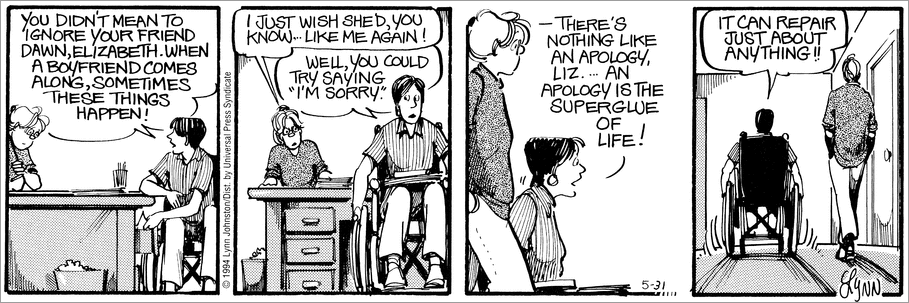Every great mistake has a halfway moment, a split second when it can be recalled and perhaps remedied.
Pearl S. Buck (1892-1973) American writer
What America Means to Me, ch. 10 (1942)
(Source)
Critiquing lack of American policy in Asia, not just to defeat Japan, but to bring freedom to the people of China and India.
Quotations about:
correction
Note not all quotations have been tagged, so Search may find additional quotes on this topic.
There is nothing as easy as denouncing. It don’t take much to see that something is wrong, but it does take some eyesight to see what will put it right again.
Miss Manners corrects only upon request. Then she does it from a distance, with no names attached, and no personal relationship, however distant, between the corrector and the correctee. She does not search out errors like a policeman leaping out of a speed trap. When Miss Manners observes people behaving rudely, she behaves politely to them, and then goes home and snickers about them afterward.
Judith Martin (b. 1938) American author, journalist, etiquette expert [a.k.a. Miss Manners]
Miss Manners’ Guide to Excruciatingly Correct Behavior, Introduction (1983)
(Source)
A successful man is simply one who doesn’t make a fool of himself in the same way more than two or three times running.
H. L. Mencken (1880-1956) American writer and journalist [Henry Lewis Mencken]
A Little Book in C Major, ch. 3, § 5 (1916)
(Source)
It is almost as difficult to make a man unlearn his errors as his knowledge. Mal-information is more hopeless than non-information; for error is always more busy than ignorance. Ignorance is a blank sheet, on which we may write; but error is a scribbled one, on which we must first erase. Ignorance is contented to stand still with her back to the truth; but error is more presumptuous, and proceeds in the same direction. Ignorance has no light, but error follows a false one. The consequence is, that error, when she retraces her footsteps, has further to go, before she can arrive at the truth, than ignorance.
Charles Caleb "C. C." Colton (1780-1832) English cleric, writer, aphorist
Lacon: Or, Many Things in Few Words, Vol. 1, § 1 (1820)
(Source)
The one thing needed is the correction of terms. […] If terms be incorrect, then statements do not accord with facts; and when statements and facts do not accord, then business is not properly executed; when business is not properly executed, order and harmony do not flourish; when order and harmony do not flourish, then justice becomes arbitrary; and when justice becomes arbitrary the people do not know how to move hand or foot. Hence whatever a wise man denominates he can always definitely state, and what he so states he can put into practice, for the wise man will no no account have anything remiss in his definitions.
[擧爾所知、爾所不知、人其舍諸。 … 名不正、則言不順、言不順、則事不成。事不成、則禮樂不興、禮樂不興、則刑罰不中、刑罰不中、則民無所措手足。 故君子名之必可言也、言之必可行也、君子於其言、無所茍而已矣。]
Confucius (c. 551- c. 479 BC) Chinese philosopher, sage, politician [孔夫子 (Kǒng Fūzǐ, K'ung Fu-tzu, K'ung Fu Tse), 孔子 (Kǒngzǐ, Chungni), 孔丘 (Kǒng Qiū, K'ung Ch'iu)]
The Analects [論語, 论语, Lúnyǔ], Book 13, verse 3 (13.3.2, 5-7) (6th C. BC – AD 3rd C.) [tr. Soothill (1910)]
(Source)
On the first thing he would do if given administration of a government. See also Socrates. Brooks identifies this as an interpolation to Book 13 around the time of Book 19.
(Source (Chinese)). Alternate translations:
What is necessary is to rectify names. [...] If names be not correct, language is not in accordance with the truth of things. If language be not in accordance with the truth of things, affairs cannot be carried on to success. When affairs cannot be carried on to success, proprieties and music will not flourish. When proprieties and music do not flourish, punishments will not be properly awarded. When punishments are not properly awarded, the people do not know how to move hand or foot. Therefore a superior man considers it necessary that the names he uses may be spoken appropriately, and also that what he speaks may be carried out appropriately. What the superior man requires, is just that in his words there may be nothing incorrect.
[tr. Legge (1861)]
One thing of necessity, the rectification of terms. [...] If terms be incorrect, language will be incongruous; and if language be incongruous, deeds will be imperfect. -- So, again, when deeds are imperfect, propriety and harmony cannot prevail, and when this is the case laws relating to crime will fail in their aim; and if these last so fail, the people will not know where to set hand or foot. -- Hence, a man of superior mind, certain first of his terms, is fitted to speak; and being certain of what he says can proceed upon it. In the language of such a person there is nothing heedlessly irregular, -- and that is the sum of the matter.
[tr. Jennings (1895)]
I would begin by defining the names of things. [...] Now, if names of things are not properly defined, words will not correspond to facts. When words do not correspond to facts, it is impossible to perfect anything. Where it is impossible to perfect anything, the arts and institutions of civilisation cannot flourish. When the arts and institutions of civilisation cannot flourish, law and justice cannot attain their ends; and when law and justice do not attain their ends, the people will be at a loss to know what to do. Therefore a wise and good man can always specify whatever he names; whatever he can specify, he can carry out. A wise and good man makes it a point always to be exact in the words he uses.
[tr. Ku Hung-Ming (1898)]
Settle the names (determine a precise terminology). [...] If words (terminology) are not (is not) precise, they cannot be followed out, or completed in action according to specifications. When the services (actions) are not brought to true focus, the ceremonies and music will not prosper; where rites and music do not flourish punishments will be misapplied, not make bullseye, and the people won’t know how to move hand or foot (what to lay hand on, or stand on). Therefore the proper man must have terms that can be spoken, and when uttered be carried into effect; the proper man’s words must cohere to things, correspond to them (exactly) and no more fuss about it.
[tr. Pound (1933)]
It would certainly be to correct language. [...] If language is incorrect, then what is said does not concord with what was meant; and if what is said does not concord with what was meant, what is to be done cannot be effected. If what is to be done cannot be effected, then rites and music will not flourish. If rites and music do not flourish, then mutilations and lesser punishments will go astray. And if mutilations and lesser punishments go astray, then the people have nowhere to put hand or foot. Therefore the gentleman uses only such language as is proper for speech, and only speaks of what it would be proper to carry into effect. The gentleman, in what he says, leaves nothing to mere chance.
[tr. Waley (1938)]
The indispensable is to render designations correct. [...] If the designations are not correct, language will not be clear. If language is not clear, duties will not be carried out. If duties arc not carried out, rites and music will not flourish. If rites and music do not flourish, then punishments will not be specific. If punishments arc not specific, then the people will do nothing without getting into trouble, lienee when the perfect gentleman has given something a name it may with all certainty be expressed in language; when he expresses it, it may with certainty be set in operation. In regard to his language the perfect gentleman is never careless in any respect.
[tr. Ware (1950)]
If something has to be put first, it is, perhaps, the rectification (cheng) of names. [...] When names are not correct, what is said will not sound reasonable; when what is said does not sound reasonable, affairs will not culminate in success; when affairs do not culminate in success, rites and music will not flourish; when rites and music do not flourish, punishments will not fit the crimes; when punishments do not fit the crimes, the common people will not know where to put hand or foot. Thus when the gentleman names something, the name is sure to be usable in speech, and when he says something this is sure to be practicable. The thing about the gentleman is that his is anything but casual where speech is concerned.
[tr. Lau (1979)]
What is necessary is to rectify names, is it not? [...] If names are not rectified, then words are not appropriate. If words are not appropriate, then deeds are not accomplished. If deeds are not accomplished, then the rites and music do not flourish. If the rites and music do not flourish, then punishments do not hit the mark. If punishments do not hit the mark, then the people have nowhere to put hand or foot. So when a gentleman names something, the name can definitely be used in speech; and when he says something, it can definitely be put into practice. In his utterances the gentleman is definitely not casual about anything.
[tr. Dawson (1993)]
It would certainly be to rectify the names. [...] If the names are not correct, language is without an object. When language is without an object, no affair can be effected. When no affair can be effected, rites and music wither. When rites and music wither, punishments and penalties miss their target. When punishments and penalties miss their target, the people do not know where they stand. Therefore whatever a gentleman conceives of, he must be able to say; and whatever he says, he must be able to do. In the matter of language, a gentleman leaves nothing to chance.
[tr. Leys (1997)]
It must be the rectification of character. [...] For if characters are not correct, speech will not be relevant; if speech is not relevant, affairs will not be accomplished; if affairs are not accomplished, the rituals and music will not prevail; if the rituals and music do not prevail, tortures and penalties will not be just right; if tortures and penalties are not just right, the people will not know where to put their hands and feet. Therefore, when the gentleman adopts a character, he surely can used it to say things; when he says something, it surely can be put into practice. The gentleman, in regard to his speech, is never negligent, that is all.
[tr. Huang (1997)]
I must define the intention of names! [...] If the intention of names is not defined, the word will not be exact; if the word is not exact, the thing will not be done; if the thing is not done, the rituals and music will not be practiced; if the rituals and music are not practiced, the penalty will not be appropriate; if the penalty is not appropriate, people will not know where to go and how to do. So a gentleman must can word out its intention when he names a thing, and must can practice it after he words out the intention. So a gentleman is never unserious to his words.
[tr. Cai/Yu (1998), #313]
Without question it would be to insure that names are used properly (zhengming). [...] When names are not used properly, language will not be used effectively; when language is not used effectively, matters will not be taken care of; when matters are not taken care of, the observance of ritual propriety (li) and the playing of music (yue) will not flourish; when the observance of ritual propriety and the playing of music do not flourish, the application of laws and punishments will not be on the mark. When the application of laws and punishments is not on the mark, the people will not know what to do with themselves. Thus, when the exemplary person puts a name to something, it can certainly be spoken, and when spoken it can certainly be acted upon. There is nothing careless in the attitude of the exemplary person toward what is said.
[tr. Ames/Rosemont (1998)]
It would certainly be to rectify names, would it not? [...] If names are not rectified, speech will not be representative. If speech is not representative, things will not get done. If things do not get done, rites and music will not flourish. If rites and music do not flourish, punishments and penalties will not be just. And if punishments and penalties are not just, the people will have nowhere to put hand or foot. Therefore, as to the gentleman: if he names something, it must be sayable, and if he says something, it must be doable. The gentleman's relation to words is to leave nothing whatever to chance.
[tr. Brooks/Brooks (1998)]
The rectification of names. Without a doubt. [...] Listen. If names aren't rectified, speech doesn't follow from reality. If speech doesn't follow from reality, endeavors never come to fruition. If endeavors never come to fruition, then Ritual and music cannot flourish. If Ritual and music cannot flourish, punishments don't fit the crime. If punishments don't fit the crime, people can't put their hands and feet anywhere without fear of losing them. Naming enables the noble-minded to speak, and speech enables the noble-minded to act. Therefore, the noble-minded are anything but careless in speech.
[tr. Hinton (1998)]
It would, of course, be the rectification of names. [...] If names are not rectified, speech will not accord with reality; when speech does not accord with reality, things will not be successfully accomplished. When things are not successfully accomplished, ritual practice and music will fail to flourish; when ritual and music fail to flourish, punishments and penalties will miss the mark. And when punishments and penalties miss the mark, the common people will be at a loss as to what to do with themselves. This is why the gentleman only applies names that can be properly spoken and assures that what he says can be properly put into action. The gentleman simply guards against arbitrariness in his speech. That is all there is to it.
[tr. Slingerland (2003)]
If I had to name my first action, I would rectify names. [...] If names are not rectified, then speech will not function properly, and if speech does not function properly, then undertakings will not succeed. If undertakings do not succeed, then rites and music will not flourish. If rites and music do not flourish, then punishments and penalties will not be justly administered. And if punishments and penalties are not justly administered, then the common people will not know where to place their hands and feet. Therefore, when the gentleman names a thing, that naming can be conveyed in speech, and if it is conveyed in speech, then it can surely be put into action. When the gentleman speaks, there is nothing arbitrary in the way he does so.
[tr. Watson (2007)]
It would have to be rectifying names. [...] If names are not rectified, what is said will not seem reasonable. When what is said does not seem reasonable, nothing will be accomplished. When nothing gets accomplished, rites and music will not flourish. When rites and music do not flourish, punishment and penalties [will take their place, and they] will fail to be just when put into use. And when punishments and penalties fail to be just in practice, people will not know where to put their hands and feet. Thus when a gentleman names something, the name can surely hold up in speech. When he says something, his words can surely be carried out in action. When a gentleman speaks, there is nothing casual or careless about what he says.
[tr. Chin (2014)]
Progress in science is often built on wrong theories that are later corrected. It is better to be wrong than to be vague.
Freeman Dyson (1923-2020) English-American theoretical physicist, mathematician, futurist
The Scientist as Rebel, Part 3, ch. 19 “The World on a String” (2006)
(Source)
Originally published in New York Review of Books (2003-11-06).
We are willing to acknowledge our shortcomings, we are willing to be punished for them, we will patiently suffer much on their account, but we become impatient if we are required to overcome them.
[Man läßt sich seine Mängel vorhalten, man läßt sich strafen, man leidet manches um ihrer willen mid Geduld; aber ungeduldig wird man, wenn man sie ablegen soll.]
Johann Wolfgang von Goethe (1749-1832) German poet, statesman, scientist
Elective Affinities [Die Wahlverwandtschaften], Part 2, ch. 5, “From Ottilie’s Journal [Aus Ottiliens Tagebuche]” (1809) [tr. Hollingdale (1971)]
(Source)
(Source (German)). Alternate translation:
People will allow their faults to be shown them; they will let themselves be punished for them; they will patiently endure many things because of them; they only become impatient when they have to lay them aside.
[Niles ed. (1872)]
A physician would not cure his patients more effectually if he were angry with them for being ill, and the criminal law is not more effective when it is inspired by anger against the criminal. The criminal presents a problem, psychological, educational, sociological, and economic; this difficult problem is not best handled in a state of blind rage. All arguments for corporal punishment spring from anger, not from scientific understanding. As men become more scientific, such barbaric practices will be no longer tolerated.
Bertrand Russell (1872-1970) English mathematician and philosopher
“On corporal punishment,” New York American (1932-09-07)
(Source)
Evil communication corrupts good manners. I hope to live to hear that good communication corrects “bad manners.”
Benjamin Banneker (1731-1806) American naturalist, surveyor, almanac author, mathematician
Handwritten note in one of his almanacs
(Source)
Quoted in Friends' Intelligencer, vol. 11 (1854).
Do not persist in folly. Some make a duty of failure and having started down the wrong road, think it a badge of character to continue.
[No proseguir la necedad. Hacen algunos empeño del desacierto, y porque comenzaron a errar, les parece que es constancia el proseguir.]
Baltasar Gracián y Morales (1601-1658) Spanish Jesuit priest, writer, philosopher
The Art of Worldly Wisdom [Oráculo Manual y Arte de Prudencia], § 261 (1647) [tr. Fischer (1937)]
(Source)
(Source (Spanish)). Alternate translations:
Not to continue a Foppery. Some make an engagement of their mistakes: when they have once begun to fail, they think they are concerned in honour to continue.
[Flesher ed. (1685)]
Do not follow up a Folly. Many make an obligation out of a blunder, and because they have entered the wrong path thinks it proves their strength of character to go in it.
[tr. Jacobs (1892)]
Don’t persist in folly. Some people commit themselves to their errors. They act mistakenly and consider it constancy to go on that way.
[tr. Maurer (1992)]
It is only an error in judgment to make a mistake, but it argues an infirmity of character to stick to it.
Adela Rogers St. Johns (1894-1988) American journalist, novelist, screenwriter.
Some Are Born Great (1974)
(Source)
Since we all need reproving and rebuking, and since we all know that we need reproving and rebuking, we ought — if we were logical — to be extremely grateful to those who reprove and rebuke us. And I suppose that, sooner or later, we are; but almost invariably later.
Since we can never know anything for sure, it is simply not worth searching for certainty; but it is well worth searching for truth; and we do this chiefly by searching for mistakes, so that we have to correct them.
Sir Karl Popper (1902-1994) Austrian-British philosopher
“Knowledge and the Shaping of Reality,” lecture, Alpbach (Aug 1982)
(Source)
Reprinted in In Search of a Better World, ch. 1 (1994).
It is better to correct your own faults than those of another.
[Κρέσσον τὰ οἰκήϊα ἐλέγχειν ἁμαρτήματα ἢ τὰ ὀθνεῖα.]
Democritus (c. 460 BC - c. 370 BC) Greek philosopher
Frag. 60 (Diels) [tr. Bakewell (1907)]
(Source)
Original Greek. Diels cites this as "Fragment 60, (114 N.) DEMOKRATES. 25"; collected in Joannes Stobaeus (Stobaios) Anthologium III, 13, 46. Bakewell lists this under "The Golden Sayings of Democritus." Freeman notes this as one of the Gnômae, from a collection called "Maxims of Democratês," but because Stobaeus quotes many of these as "Maxims of Democritus," they are generally attributed to the latter.
Alternate translations:
- "It is better to examine one's own faults than those of others." [tr. Freeman (1948)]
- "It is better to examine your own mistakes than those of others." [tr. Barnes (1987)]
- "It is better to rebuke familiar faults than foreign ones." [tr. @sententiq (2018)]
- "Rather examine your own faults than those of others." [Source]
Errors and mistakes, however gross, in matters of opinion, if they are sincere, are to be pitied, but not punished nor laughed at. The blindness of the understanding is as much to be pitied as the blindness of the eye, and there is neither jest nor guilt in a man’s losing his way in either case. Charity bids us set him right if we can, by arguments and persuasions; but charity, at the same time, forbids, either to punish or ridicule his misfortune.
Lord Chesterfield (1694-1773) English statesman, wit [Philip Dormer Stanhope]
Letter to his son, #126 (21 Sep 1747)
(Source)
On religious tolerance.
Even when laws have been written down, they ought not always to remain unaltered. As in other sciences, so in politics, it is impossible that all things should be precisely set down in writing; for enactments must be universal, but actions are concerned with particulars.
Aristotle (384-322 BC) Greek philosopher
Politics [Πολιτικά], Book 2, ch. 8 / 1269a.9 [tr. Jowett (1885)]
(Source)
Alt. trans.
- "Nor is it, moreover, right to permit written laws always to remain without alteration; for as in all other sciences, so in politics, it is impossible to express everything in writing with perfect exactness; for when we commit anything to writing we must use general terms, but in every action there is something particular to itself, which these may not comprehend." [tr. Ellis (1912)]
- "Moreover even written codes of law may with advantage not be left unaltered. For just as in the other arts as well, so with the structure of the state it is impossible that it should have been framed aright in all its details; for it must of necessity be couched in general terms, but our actions deal with particular things." [tr. Rackham (1932)]
- "In addition t this, it is not best to leave written laws unchanged. For just as in the case of the other arts, so with respect to political arrangements it is impossible for everything to be written down precisely; for it is necessary to write them in universal fashion, while actions concern particulars." [tr. Lord (1984)]
The best way to get the right answer on the Internet is not to ask a question; it’s to post the wrong answer.
Howard G. "Ward" Cunningham (b. 1949) American computer scientist
“Cunningham’s Law”
(Source)
Cunningham himself denies having said this. It was attributed to him (and so named) by Steven McGeady in the early 1980s.
You couldn’t get hold of the things you’d done and turn them right again. Such a power might be given to the gods, but it was not given to women and men, and that was probably a good thing. Had it been otherwise, people would probably die of old age still trying to rewrite their teens.
If forty million people say a foolish thing it does not become a wise one, but the wise man is foolish to give them the lie.
W. Somerset Maugham (1874-1965) English novelist and playwright [William Somerset Maugham]
A Writer’s Notebook (1949)
An entry dated 1901. More discussion about this quotation: If Fifty Million People Say a Foolish Thing, It Is Still a Foolish Thing – Quote Investigator
I’ll not willingly offend,
Nor be easily offended;
What’s amiss I’ll strive to mend,
And endure what can’t be mended.Isaac Watts (1674-1748) English theologian and hymnodist
Poems, “Moral Songs: #6 Good Resolutions”
(Source)
In Samuel Johnson, Works of English Poets, vol. 46 (1779)
If you look at automata which have been built by men or which exist in nature you will very frequently notice that their structure is controlled to a much larger extent by the manner in which they might fail and by the (more or less effective) precautionary measures which have been taken against their failure. And to say that they are precautions against failure is to overstate the case, to use an optimistic terminology which is completely alien to the subject. Rather than precautions against failure, they are arrangements by which it is attempted to achieve a state where at least a majority of all failures will not be lethal. There can be no question of eliminating failures or of completely paralyzing the effects of failures. All we can try to do is to arrange an automaton so that in the vast majority of failures it can continue to operate. These arrangements give palliatives of failures, not cures. Most of the arrangements of artificial and natural automata and the principles involved therein are of this sort.
John von Neumann (1903-1957) Hungarian-American mathematician, physicist, inventor, polymath [János "Johann" Lajos Neumann]
Theory of Self-Reproducing Automata, Lecture 3 “Statistical Theories of Information”
(Source)
Science, my lad, has been built upon many errors; but they are errors which is was good to fall into, for they led to the truth.
Jules Verne (1828-1905) French novelist, poet, playwright
Journey to the Center of the Earth [Voyage au centre de la Terre], ch. 30 [Liedenbrock] (1864)
(Source)
Alt. trans.: "Science, my lad, is made up of mistakes, but they are mistakes which it is useful to make, because they lead little by little to the truth."
In the course of my life I have often had to eat my words, and I must confess that I have always found it a wholesome diet.
Winston Churchill (1874-1965) British statesman and author
Comment (c. 1940s)
(Source)
Quoted by Lord Normanbrook in John Wheeler-Bennett, ed., Action This Day: Working with Churchill, p. 28 (1968).
Frequently paraphrased as:
- "Eating my words has never given me indigestion."
- "I have never developed indigestion from eating my words."
The best way I kno ov tew repent of enny thing is tew do better next time.
[The best way I know of to repent of anything is to do better next time.]
Josh Billings (1818-1885) American humorist, aphorist [pseud. of Henry Wheeler Shaw]
Everybody’s Friend, Or; Josh Billing’s Encyclopedia and Proverbial Philosophy of Wit and Humor, ch. 139 “Affurisms: Hooks & Eyes” (1874)
(Source)
Variant:
The best way I know to REPENT of anything is not to do it again and to do better next time.
[H. Montague, ed., Wit and Wisdom of Josh Billings (1913)]
Truth will do well enough if left to shift for herself. She seldom has received much aid from the power of great men to whom she is rarely known & seldom welcome. She has no need of force to procure entrance into the minds of men. Error indeed has often prevailed by the assistance of power or force. Truth is the proper & sufficient antagonist to error.
Thomas Jefferson (1743-1826) American political philosopher, polymath, statesman, US President (1801-09)
“Notes on Religion” (1776-10?)
(Source)
Labeled by Jefferson "Scraps Early in the Revolution."
Correction does much, but encouragement does more.
Johann Wolfgang von Goethe (1749-1832) German poet, statesman, scientist
(Attributed) [tr.Wenckstern (1853)]
(Source)
O my son!
These are no trifles! Think: all men make mistakes,
But a good man yields when he knows his course is wrong,
And repairs the evil. The only crime is pride.Sophocles (496-406 BC) Greek tragic playwright
Antigone, l. 1022ff [Tiresias] (441 BC) [tr. Fitts/Fitzgerald (1939), ll. 803ff]
(Source)
Alt. trans.:
Then take these things to heart, my son: for error
Is as the universal lot of man;
But whenso'er he errs, that man no longer
Is witless or unblessed, who, having fallen
Into misfortune, seeks to mend his ways
And is not obstinate: the stiffneckt temper
Must oft plead guilty to the charge of folly.
[tr. Donaldson (1848)]
Now, then, my son, take thought. A man may err;
But he is not insensate or foredoomed
To ruin, who, when he hath lapsed to evil,
Stands not inflexible, but heals the harm.
The obstinate man still earns the name of fool.
[tr. Campbell (1873)]
O ponder this, my son. To err is common
To all men, but the man who having erred
Hugs not his errors, but repents and seeks
The cure, is not a wastrel nor unwise.
No fool, the saw goes, like the obstinate fool.
[tr. Storr (1859)]
Think, therefore, on these things, my son. All men are liable to err. But when an error is made, that man is no longer unwise or unblessed who heals the evil into which he has fallen and does not remain stubborn. Self-will, we know, invites the charge of foolishness.
[tr. Jebb (1891)]
Consider this, my son! and, O remember,
To err is human; 'tis the common lot
Of frail mortality; and he alone
Is wise and happy, who, when ills are done,
Persists not, but would heal the wound he made.
[tr. Werner (1892)]
Think, then, on these things, my son. All men are liable to err; but when an error hath been made, that man is no longer witless or unblest who heals the ill into which he hath fallen, and remains not stubborn. Self-will, we know, incurs the charge of folly.
[tr. Jebb (1917)]
Mark this, my son: all men fall into sin.
But sinning, he is not forever lost
Hapless and helpless, who can make amends
And has not set his face against repentance.
Only a fool is governed by self-will.
[tr. Watling (1939)]
Think of these things, my son. All men may err
but error once committed, he's no fool
nor yet unfortunate, who gives up his stiffness
ad cures the trouble he has fallen in.
Stubbornness and stupidity are twins.
[tr. Wyckoff (1954)]
Be warned, my son, No man alive is free
From error, but the wise and prudent man
When he has fallen into evil courses
Does not persist, but tries to find amendment ....
[tr. Kitto (1962)]
Take these things to heart, my son, I warn you.
All men make mistakes, it is only human.
But once the wrong is done, a man
can turn his back on folly, misfortune too,
if he tries to make amends, however low he's fallen,
and stops his bullnecked ways. Stubbornness
brands you for stupidity -- pride is a crime
[tr. Fagles (1982), l. 1131ff]
Therefore, think about this, child. For men,
all of them, it is common to make mistakes.
Whenever he does make a mistake, that man is still not
foolish or unhappy who, fallen into evil,
applies a remedy and does not become immovable.
Stubborn self-will incurs a charge of stupidity.
[tr. Tyrell/Bennett (2002)]
Understand this: All men make mistakes. But when they do, it would be a wise and well acting man who corrected that mistake and moved on rather than stayed there stubbornly and unrepentant. The stubborn man is rewarded with more errors.
[tr. Theodoridis (2004)]
Consider this, my son.
All men make mistakes -- that's not uncommon.
But when they do, they’re no longer foolish
or subject to bad luck if they try to fix
the evil into which they’ve fallen,
once they give up their intransigence.
Men who put their stubbornness on show
invite accusations of stupidity.
[tr. Johnston (2005), l. 1138ff]
Therefore, think on these things, my child; for every human being makes mistakes, but when he has made a mistake, that man is no longer foolish and unhappy who remedies the evil into which he has fallen and is not stubborn. Obstinacy brings the charge of stupidity.
[tr. Thomas (2005)]
Every observation of history inspires a confidence that we shall not go far wrong; that things will mend.
Ralph Waldo Emerson (1803-1882) American essayist, lecturer, poet
“The Young American,” lecture, Mercantile Library Association, Boston (1844-02-07)
(Source)


































